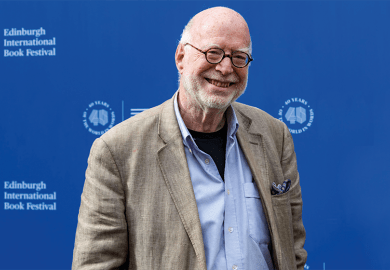The Putney Debates, witch hunting, gender-bending in colonial Africa, dinner guests from different historical moments, disgruntled fairies, cloned sons and a global war fought by all aspects of the natural world are just a few memorable scenes that Britain's most significant contemporary playwright, Caryl Churchill, is famous for staging over the past 40 years.
Surprisingly, perhaps, for a writer who works on the cutting edge, Churchill has just celebrated her 70th birthday. Published to mark that occasion, Faber's book on Churchill is part of its "About" series, which aims to reveal the lives and works of major playwrights.
Philip Roberts' work divides into two parts. The first is a survey of Churchill's work in chronological order, including commentary on 11 of her unpublished plays. The second is a compilation of previously unpublished as well as published material on Churchill, from Churchill herself, and from actors, directors, designers, dancers, a choreographer and a composer.
After a brief and disappointing introduction, and one that certainly doesn't fulfil the editorial claim to situate "the work of the writer in the relevant historical, social and political context", the first part is a slight improvement. Slight, because, as Roberts admits, commentary on the unpublished plays given to him by Churchill is "more descriptive here".
Excerpts from these unpublished plays do tantalise; however, the absence of critical analysis from Roberts is dissatisfying. Major plays, such as Cloud Nine, Top Girls, Mad Forest, Far Away and A Number, again, have their plots recounted, rather tediously, at length; although here there is a little more in the way of critical analysis. Nonetheless, the reader hoping to find sharp interpretations of Churchill's work should look elsewhere.
The strongest features of this section, albeit arranged in a rather disorganised fashion, are the snippets of contextual information. For example, we learn that Churchill was introduced to Monstrous Regiment, the feminist theatre collective, when she bumped into some of its members on a Vietnam War protest march in London.
We additionally hear Casarotto Ramsay, Churchill's agent, offer a peculiar mix of candid appraisal of Churchill's plays combined with a nurturing support, and faith in Churchill's exceptional abilities. We also gain an interesting insight into the relationship between Churchill and the Royal Court Theatre, of which she was a council member, and its first female resident dramatist (1974-75).
Given that she is a famously quiet and shy playwright, it is compelling to learn of her seemingly lone but vocal opposition to commercial sponsorship for the Royal Court in council meetings and her subsequent resignation. It is refreshing to hear of a writer who doesn't confine her politics to the stage. She says in her Council resignation letter: "There's been a lot of talk ... about the 'times' as if they were a force of nature - we are part of them just as much as the government, the city and business interests, and our opposition can be part of them."
The reader of this book is more rewarded in the second part. Churchill's well-known avoidance of interviews makes these previously unpublished contributions by her, drawn mostly from exchanges with Roberts, a fascinating addition to Churchill scholarship. Contributions from actors, directors and others provide riveting accounts of workshops, rehearsals and performances of Churchill's work. We are left with the impression of a self-effacing writer, one who is an exceptional innovator and one who, more than any other, seems to engage with the issues of the moment. The testimony on display here speaks of Churchill's kindness and sensitivity, as well as providing evidence of her artistic brilliance.
Overall, students and theatregoers will find this book accessible and illuminating. Although it is weak on play analysis, rather understating of the political significance of Churchill's work and neglectful of social, political and historical context, the book offers the reader knowledge of the sheer breadth of plays Churchill wrote and theatrical activities she took part in.
Roberts also demonstrates in detail Churchill's signature custom of continually revitalising dramatic form; provides a good insight into Churchill's working methods and practices; makes vivid performances of Churchill's plays; and explores the numerous collaborations to which Churchill has contributed.
About Churchill: The Playwright and the Work. By Philip Roberts
Faber and Faber 336pp, £12.99. ISBN 9780571229628. Published 18 September 2008
Register to continue
Why register?
- Registration is free and only takes a moment
- Once registered, you can read 3 articles a month
- Sign up for our newsletter
Subscribe
Or subscribe for unlimited access to:
- Unlimited access to news, views, insights & reviews
- Digital editions
- Digital access to THE’s university and college rankings analysis
Already registered or a current subscriber? Login



